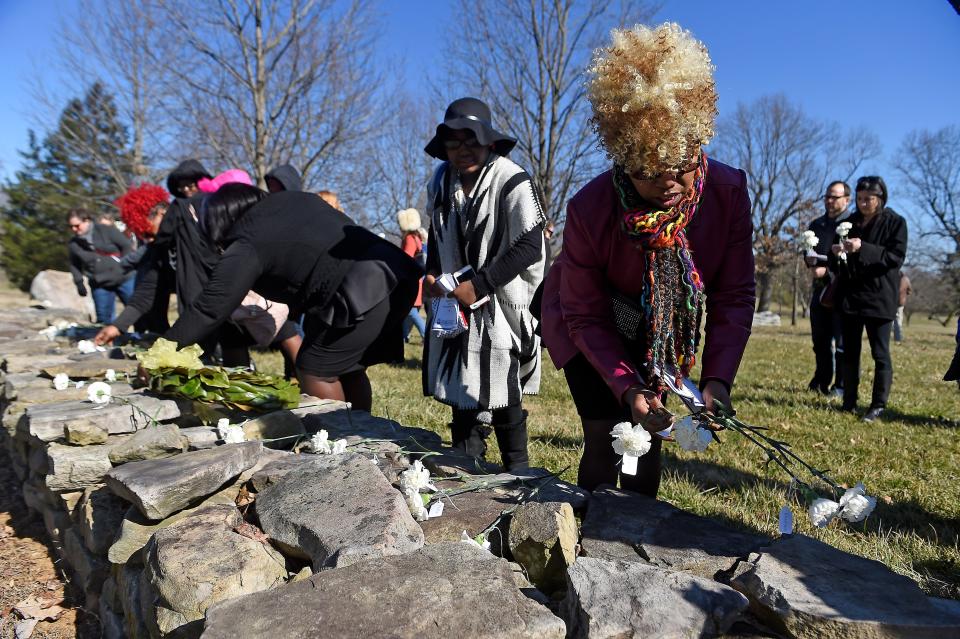Enslaved people's records show a grim, but needed, look at what made Nashville | Opinion
“We are not makers of history. We are made by history.”
— Dr. Martin Luther King Jr.
The spreadsheet, more than 14,000 rows deep with data, might bore you – until the names stop you cold: Eliza, age 3; Peter, 11; Martha Foster, 1. After each, it reads “child of Albert and Betsy.”
On Nov. 1, 1852, it says, John Nichol sold Albert and Betsy, along with Eliza, Peter, Martha Foster and their other five children to Bradford Franklin. Davidson County legally recorded this enslaved family as property, bought and sold.
Metro Archivist Ken Fieth has spent some 25 years compiling a searchable spreadsheet, available here. Transaction by transaction, it lists buyer, seller, enslaved person’s name, gender, age and relatives (if known).
These transactions are part of what made us who we are, what made Nashville the place that it is. It is the big “how” and the big “why” of the racism that still plagues us.
Hear more Tennessee Voices: Get the weekly opinion newsletter for insightful and thought provoking columns.
This is an opportunity to explore the institution of slavery
As researchers mine these records, they must never forget that they describe transactions in human flesh. They are accounts of the breakup of families as the result of enslavers’ deaths, debts and displeasure.

In some instances, the records chronicle transactions that secured a white family’s future while dooming enslaved Blacks to a continued life of fear, anxiety and the dread of their families being separated.
Each sale, transfer and trade listed represented a literal death of a mother, father, child or friend as they ultimately were separated permanently from the communities they knew and loved. These records outline a history of uncertain futures in Davidson County.
Despite the grim nature of these records, they provide a unique opportunity for African Americans interested in slavery in the Volunteer State to explore the institution. It provides the names of the enslaved as well as the enslavers and the reasons why they were being sold.

Your state. Your stories. Support more reporting like this.
A subscription gives you unlimited access to stories across Tennessee that make a difference in your life and the lives of those around you. Click here to become a subscriber.
Database is useful to genealogists, researchers and curious citizens
Genealogists now have a new tool — one that reaches further in the past and provides more information than the 1850 and 1860 U.S. Census Slave Schedules.

It enables them to move beyond what is, for many African Americans, the impenetrable wall of the 1870s census in their effort to retrace their families’ histories.
Scholars of African American and Nashville history will find the database useful as it allows them to animate the story of Nashville’s Antebellum history in ways rarely done in the past.
Now, when we discuss one of the more harrowing and psychologically devastating aspects of enslavement — the violent, physical separation of friends and families from their loved ones —we have access to the names of the victims and motives of the sellers to aid us in shining a new light on this period.
Register of Deeds office sworn to sharing data with the public
Today, as the real estate market booms, the Register of Deeds Office records hundreds of property documents daily, run by the first woman and the first African American elected to the position.

Office employees are sworn to record property correctly and make those records — dating back to before Tennessee became a state — easily available.
It also is our duty to make the public aware of documents like those that recorded the sale of Albert, Betsy and their children, as if they were weeded acres of land.
That is our history, part of who we are, both Black and white. If we are ever to reckon with racism, we must reckon with its original sin — that of slavery.
Karen Johnson is the Davidson County Register of Deeds, and Dr. Learotha Williams is on the faculty of the History Department at Tennessee State University. Find the spreadsheet at Data.Nashville.gov and search for the "Nashville Slave and Free People of Color Database.
This article originally appeared on Nashville Tennessean: Enslaved Black people's public records show what made Nashville
